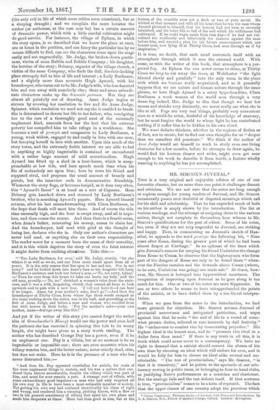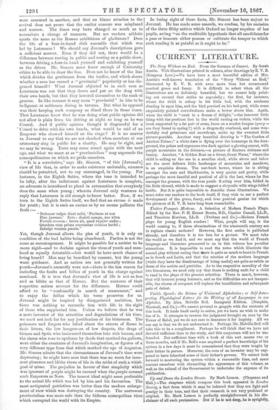MR. SIMCOX'S JUVENAL.*
Tito is a very original and enjoyable edition of one of our favourite classics, but on more than one point it challenges dissent and criticism. We are not sure that the notes are long enough or copious enough for young readers of Juvenal, and Mr. Situ= occasionally passes over doubtful or disputed meanings which call for his skill and scholarship. That he has expended much of both on his author is amply shown by the introduction. The list ot various readings, and the attempt at assigning dates to the various satires, though not complete in themselves, bear witness to Mr. Simcox's qualifications for the post of editor. Some of his notes, too, even if they are not very respectful to Juvenal, are striking and happy. Thus, in commenting on Juvenal's sketch of Han- nibal, he appends to the word prseeps the following hit, "Nine years after Zatna, during the greater part of which he had beei. almost despot at Carthage." Iu an epitome of the lines which give Juvenal's reasons for envying his friend Umbricius the change from Rome to CLItha3, he observes that the highwaymen who form part of the dangers of Rome are only to be found there "when- ever the Pontine marshes and the firwoods above Cuinm (where, to be sure, Umbricius was going) are made safe." At times, how- ever, Mr. Simcox is betrayed into hypercritical smartness. The temptation of improving upon Juvenal as he goes along is too much for him. One or two of his notes are were flippancies. In one or two others he seems to have misapprehended the points of the satirist, or to have dulled them by a too litEral interpre- tation.
When we pass from the notes to the introduction, we find more grounds for objection. Mr. Simeox accuses Juvenal of provincial narrowness and antiquated patriotism, and urges against him that he seeks "the end of life in a round of some- what prosaic duties, relieved at rare intervals by dull festivity." He "endeavours to combat vice by consecrating prejudice." His highest ideal is the honest man, and he "presents this ideal in a duller form than u.sual." If there is any truth in all this, it is truth which could never occur to a contemporary. We have no right to demand that a satirist should correct the abuses of his own time by choosing an ideal which will endure for ever, and it would be folly for him to choose an ideal alike eternal and un- attainable. "The test of provincialism," says Mr. Sitneox, "is that it is transitory," and he points to the spectacle of. our aris- tocracy rowing in public races, or belonging to four-in-baud clubs, as justifying Nero's performances as a musician and charioteer. But the analogy fails and the teat defeats itself. If that sentence is true, "provincialism" ceases to be a term of reproach. The fact that the upper classes of one country adopt the practices which • Catena Clauteorum. Thirteen Satires of Juvenal, with Notes and Introduction. By G. A. Simeox, ILA, Fellow of Queen's College, Oxford. London : IIIvingtons.
were censured in another, and that no blame attaches to the revival does not prove that the earlier censure was misplaced and narrow. The times may have changed so much as to necessitate a change of manners. But are modern athletic sports the same as the Roman exhibitions of gladiators ? Does the life of a four-in-hand club resemble that which was led by Lateranus ? We should say JuvenaPs descriptions gave a sufficient answer. Even if they did not, there would be a difference between rowing in public and rowing as a public show, between driving a four-in-hand yourself and exhibiting yourself as the driver. Mr. Simcox must know enough of University ethics to be able to draw the line. Does not he know of the line which divides the gentleman from the turfite, and which shows whether a man has earned a "provincial" popularity or has dis- graced himself ? What Juvenal objected to in such men as Lateranus was not that they drove and put on the drag with their own hands, but that they lowered themselves to the rank of grooms. In like manner it may seem "provincial" in him to be indignant at noblemen dining in taverns. But what he opposed was their keeping such company as dined there in those times. That Lateranus knew that he was doing what public opinion did
not allow is plain from his driving at night so long as he was -Consul. And if public opinion thought it disgraceful for a " Consul to drive with his own hands, what would be said of an Emperor who showed himself on the stage ? It is no answer to Juvenal to say that we are not shocked when members of our
aristocracy sing in public for a charity. He may be right, and -we may be wrong. Taste may come round again with the next age, and what we sneer at as " provincialism " may supersede the cosmopolitanism on which we pride ourselves.
"It is a correlative," says Mr. Simcox, "of this [JuvenaPs] view of life that, in order to make existence endurable, excesses should be permitted, not to say encouraged, in the young. For instance, in the Eighth Satire, where the tone is intended to be lofty, after the indictment against Lateranus is complete, an advocate is introduced to plead in extenuation that everybody -does the same when young ; whereto Juvenal only ventures to reply that Lateranus is old enough to know better. Now, if we turn to the Eighth Satire itself, we find that an excuse is made for youth ; but it is such an excuse as by no means palliates the fault :—
"Defonsor culpao dicet Fecimns et nos Mac juvenes.' Esto desisti nempe, nec ultra Fovisti errorem : breve sit, clued :writer nudes; Qtuedam cum prima resecontur crimina barb& ; Indulge veniam pueris."
Yet, though Juvenal allows the plea of youth, it is only on condition of the bad habits being abandoned. Pardon is not the same as encouragement. It might be possible for a satirist to be more rigid—and to declaim against the vices of youth and man- hood as equally detestable—but would he have much chance of being heard? Men may be benefited by censure, but the young want guidance. And as satires are not generally written for youth—JuvenaPs assuredly were not—there is the less reason for including the faults and follies of youth in the charge against manhood. It is true that Juvenars view of life is not as free and as blithe as that of Horace. But the contents of their respective satires account for the difference. Horace could afford to be "confessedly in search of amusement," and to enjoy the follies which his verse preserves for us. -Juvenal might be inspired by disappointed ambition, but there was nothing to reconcile him with life in the sight -of those who supplanted him. Unless we believe that he was -a mere inventor of the atrocities and degradations of his time, we need not look far for any justification of his bitterness. The poisoners and forgers who lolled about the streets of Rome in their litters, the low hangers-on of low despots, the dregs of Greece and Syria who insinuated themselves into rich houses, and the slaves who rose to opulence by deeds that merited the gallows, were either the creatures of Juvenars imagination, or figures of a very different type from that which marked the age of Augustus.
Siincox admits that the circiunstances of JuvenaPs time were
depressing ; he might have seen that there was no room for inno- cent pleasures and blithe views of life in the midst of such a whirl- pool of erime. The prejudice in favour of that simplicity which
was ignorant of purple might be excused when the purple covered such Emperors as Nero. The tamest ideal might seem preferable -to the actual life which was led by him and his favourites. The most antiquated patriotism was better than the modern enlarge- ment of view which was destroying the country. The narrowest provincialism was more safe than the hideous cosmopolitan vices which corrupted the world with its Empire.
In losing sight of these facts, Mr. Simcox has been unjust to Juvenal. He has made some amends, we confess, by his omission of the three filthy satires which Oxford no longer requires of her pupils, acting "on the creditable hypothesis that all candidates for a peas or honours either possess or cultivate the temper to which such reading is as painful as it ought to be."



































 Previous page
Previous page